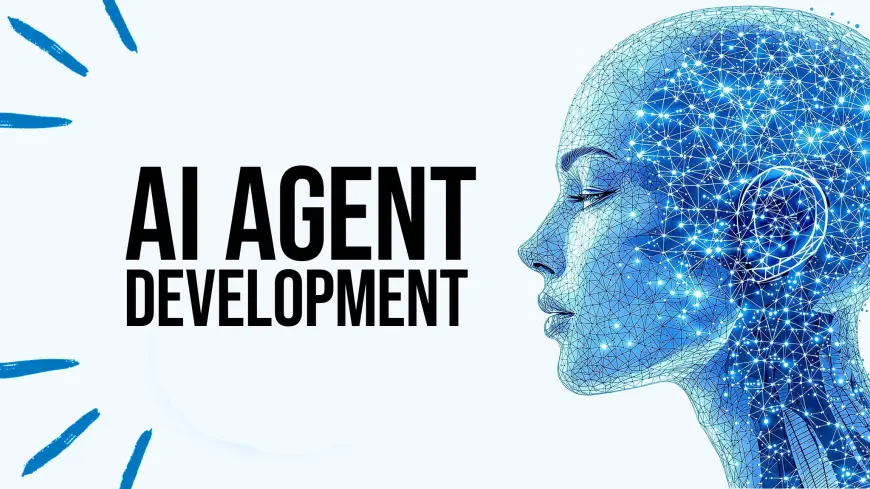How AI Agents Are Enhancing User Experience in 2025
AI agents in 2025 are revolutionizing user experience by offering personalized, efficient, and intuitive interactions across industries.

The integration of Artificial Intelligence (AI) in daily life has dramatically reshaped industries and processes. Among the most significant developments in AI is the evolution of AI agents. These intelligent systems are becoming increasingly sophisticated, allowing businesses to offer seamless and personalized user experiences like never before. By 2025, AI agents are expected to enhance user experiences across diverse sectors, from e-commerce and customer support to healthcare and entertainment.
The Rise of AI Agents in User Experience
AI agents Development are software applications designed to perform specific tasks or provide services autonomously, using AI algorithms, machine learning, and natural language processing. These systems are built to interact with users in real-time, making decisions based on collected data and continuous learning.
In 2025, AI agents will play a pivotal role in shaping user experience (UX). Unlike traditional systems, which often require manual input and interaction, AI agents can learn from previous user behavior and anticipate needs. They can interact through text, voice, or even visual inputs, delivering personalized experiences that are more responsive, efficient, and intuitive.
Personalization at Scale
One of the most compelling ways AI agents are enhancing user experience is through personalization. In 2025, users will encounter AI agents that can customize services or products to meet their unique preferences, habits, and even emotional states. E-commerce platforms, for example, will use AI agents to analyze a user’s browsing history, purchase patterns, and demographic data to offer personalized product recommendations.
AI agents will go beyond simply offering products based on past purchases—they will understand the user’s preferences in a dynamic and evolving way. For instance, they could predict future buying needs based on seasonal trends, social media activity, or even personal interests. This level of personalization will not only streamline the shopping process but will also create a deeper sense of connection between brands and consumers.
In industries like entertainment, AI agents can curate movie or music recommendations by learning individual tastes, offering users new content that they might not have discovered on their own. Whether it’s personalized news feeds, educational content, or social media posts, the ability of AI agents to offer tailored experiences will redefine user engagement.
Real-Time Support and Assistance
In customer service, AI agents are already revolutionizing the way businesses engage with their customers. By 2025, AI-powered chatbots and virtual assistants will become even more intelligent and capable of handling complex inquiries in real time. They will not only provide immediate responses to common questions but will also handle more intricate tasks such as troubleshooting, product troubleshooting, and even making decisions.
For example, if a user faces an issue with a product, an AI agent will not just provide generic answers. Instead, it will analyze the problem, check for similar issues in the knowledge database, and provide a step-by-step guide to resolve the issue. These agents can handle an increasing volume of queries simultaneously, providing fast, 24/7 customer support.
Furthermore, AI agents will improve their communication skills over time, refining their responses to ensure they are more natural, empathetic, and context-aware. Natural language processing (NLP) will allow these agents to understand and interpret user sentiments, ensuring that their tone and language match the emotional context of the interaction. This human-like quality will enhance user satisfaction, making customers feel heard and valued.
Seamless Multi-Platform Integration
In 2025, AI agents will operate seamlessly across a variety of platforms, offering users a consistent experience regardless of the device or interface they choose to interact with. Whether it’s a mobile app, a smart speaker, or a virtual reality environment, users will encounter the same AI agent that has continuity of context and memory.
For example, an AI agent in an e-commerce app might assist a user in finding a product on their phone. Later, if the user switches to a desktop or voice assistant, the same AI agent can continue the conversation, offering the same recommendations, providing order updates, or even helping to complete a transaction. This cross-platform fluidity will create a seamless experience, minimizing interruptions and ensuring that users can pick up where they left off without having to re-explain their needs.
Voice-Activated and Gesture Control Interfaces
Voice assistants, such as Amazon Alexa, Google Assistant, and Apple’s Siri, have already become commonplace in many households. By 2025, voice-activated AI agents will become even more advanced, capable of understanding nuanced, conversational language. These agents will be able to manage tasks such as scheduling appointments, making reservations, and providing personalized information on the fly—just by interpreting user commands.
Similarly, AI agents will begin to integrate gesture controls, especially in devices like smart TVs, VR/AR systems, and smart home devices. For instance, users will be able to control their environment with simple gestures—turning on lights, adjusting temperatures, or controlling entertainment systems—without the need for physical remote controls. By anticipating gestures and learning the user’s movements, AI agents will enable a more intuitive and hands-free experience.
Anticipating User Needs
By 2025, AI agents will not just respond to user input—they will anticipate needs before they are explicitly stated. Machine learning algorithms will allow AI agents to process vast amounts of data, identifying patterns and predicting what a user might want next. This predictive ability will be especially useful in industries like healthcare, where AI agents could monitor patient vitals and provide early alerts for potential health issues before symptoms manifest.
For example, in a smart home, an AI agent could predict the user’s daily routine and adjust settings accordingly, such as adjusting the thermostat based on the time of day or playing music based on the user’s current activity. In e-commerce, AI agents could proactively offer discounts or suggest complementary products at the right moment in the customer journey, increasing sales and improving the user experience.
Conclusion
In 2025, AI agents will be at the forefront of enhancing user experience, offering greater personalization, real-time assistance, and seamless integration across platforms. Their ability to understand and anticipate user needs will redefine the way we interact with technology, making it more intuitive, responsive, and human-like.
The future of AI agent development promises to push the boundaries of what’s possible, offering businesses and users alike a more engaging, efficient, and rewarding digital experience. As AI continues to evolve, these intelligent agents will remain central to the way we navigate our increasingly interconnected world.
What's Your Reaction?
 Like
0
Like
0
 Dislike
0
Dislike
0
 Love
0
Love
0
 Funny
0
Funny
0
 Angry
0
Angry
0
 Sad
0
Sad
0
 Wow
0
Wow
0






















































